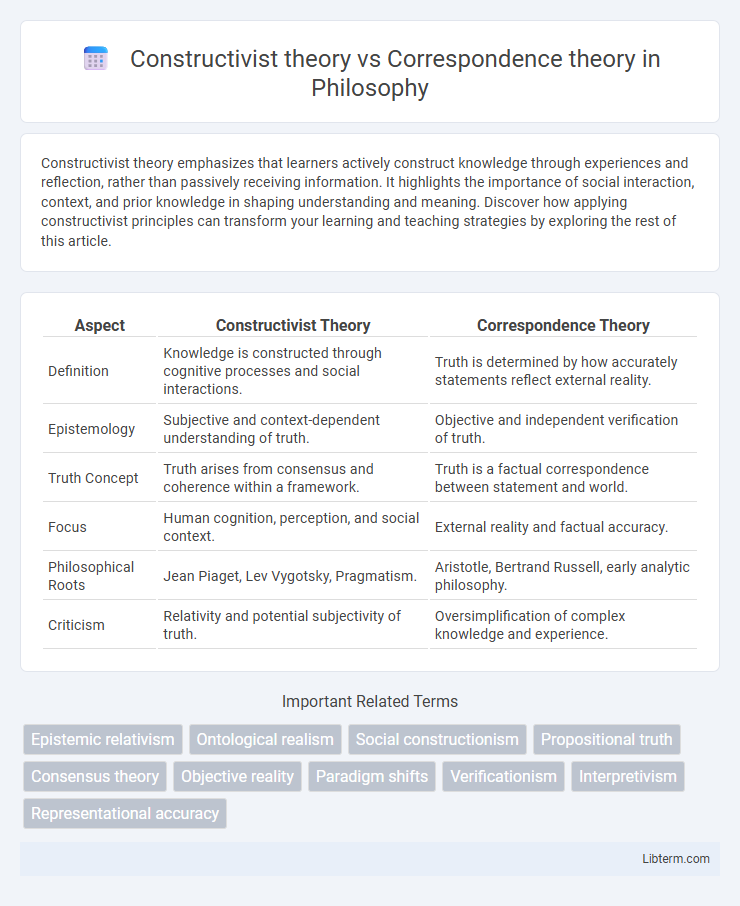Constructivist theory emphasizes that learners actively construct knowledge through experiences and reflection, rather than passively receiving information. It highlights the importance of social interaction, context, and prior knowledge in shaping understanding and meaning. Discover how applying constructivist principles can transform your learning and teaching strategies by exploring the rest of this article.
Table of Comparison
| Aspect | Constructivist Theory | Correspondence Theory |
|---|---|---|
| Definition | Knowledge is constructed through cognitive processes and social interactions. | Truth is determined by how accurately statements reflect external reality. |
| Epistemology | Subjective and context-dependent understanding of truth. | Objective and independent verification of truth. |
| Truth Concept | Truth arises from consensus and coherence within a framework. | Truth is a factual correspondence between statement and world. |
| Focus | Human cognition, perception, and social context. | External reality and factual accuracy. |
| Philosophical Roots | Jean Piaget, Lev Vygotsky, Pragmatism. | Aristotle, Bertrand Russell, early analytic philosophy. |
| Criticism | Relativity and potential subjectivity of truth. | Oversimplification of complex knowledge and experience. |
Introduction to Constructivist Theory and Correspondence Theory
Constructivist theory emphasizes that knowledge is actively constructed by individuals through experiences and interactions, highlighting the subjective nature of understanding reality. Correspondence theory asserts that truth is determined by the direct correlation between beliefs or statements and objective, observable facts in the external world. Both theories address the nature of truth but differ significantly in their approach to how knowledge and truth are established and validated.
Historical Background of Both Theories
The Constructivist theory emerged in the early 20th century, influenced by thinkers like Jean Piaget and Lev Vygotsky, emphasizing knowledge as an active, constructive process shaped by social and cognitive development. The Correspondence theory traces its roots to ancient Greek philosophy, notably Aristotle, who asserted that truth corresponds to objective reality and facts independent of perception. Both theories reflect contrasting epistemological views: constructivism centers on knowledge creation through experience, while correspondence highlights an accurate representation of an external world.
Core Principles of Constructivist Theory
Constructivist theory emphasizes that knowledge is actively constructed by individuals through experience and reflection, highlighting the learner's role in making sense of information based on prior understanding. Its core principles include the idea that learning is an active, contextualized process where learners build new knowledge upon existing cognitive structures. In contrast to correspondence theory, which focuses on knowledge as a direct reflection of objective reality, constructivism asserts that knowledge is subjective and shaped through social interactions and personal interpretation.
Key Tenets of Correspondence Theory
Correspondence theory asserts that truth is determined by how accurately a statement or belief corresponds to objective reality or facts. Key tenets include the idea that truth is independent of belief systems and is verified through empirical evidence and observation. This theory emphasizes a direct relationship between propositions and the external world, contrasting with constructivist views that see truth as socially constructed or context-dependent.
Major Differences between Constructivist and Correspondence Theories
Constructivist theory posits that knowledge is actively constructed by individuals through experience and social interaction, emphasizing subjective understanding and meaning-making, whereas Correspondence theory asserts that truth is determined by the accurate alignment of beliefs with objective reality. Constructivism highlights the role of context, culture, and cognitive processes in shaping knowledge, contrasting with Correspondence theory's focus on an independent, external truth that can be objectively verified. The major difference lies in Constructivist theory's relativistic view of truth versus Correspondence theory's commitment to an absolute, objective truth that corresponds with facts.
Strengths and Limitations of Constructivist Theory
Constructivist theory excels in emphasizing the active role of learners in constructing knowledge through experience, promoting deeper understanding and critical thinking. However, it often lacks clear criteria for truth verification, leading to potential subjectivity and difficulty in measuring knowledge accuracy. Correspondence theory, in contrast, provides a straightforward framework for truth as a direct relationship between statements and objective reality, but may overlook the nuanced processes of knowledge acquisition emphasized by constructivism.
Strengths and Critiques of Correspondence Theory
The Correspondence Theory of truth asserts that a statement is true if it accurately reflects reality, providing a clear and objective criterion for truth verification. Its strength lies in its intuitive appeal and practical applicability in empirical sciences and everyday reasoning. Critiques emphasize its limitations in addressing abstract concepts, subjective experiences, and the difficulty of establishing an exact correspondence between statements and reality in complex or ambiguous scenarios.
Applications in Education and Knowledge Acquisition
Constructivist theory emphasizes active learning where students build knowledge through experience and reflection, promoting critical thinking and problem-solving skills in educational settings. Correspondence theory centers on the alignment of beliefs with objective reality, ensuring that knowledge acquisition is verifiable and grounded in factual accuracy. In education, constructivism encourages collaborative and inquiry-based learning environments, while correspondence theory supports fact-based assessments and validation of information accuracy.
Relevance in Modern Epistemology
Constructivist theory emphasizes knowledge as a product of cognitive processes and social interactions, highlighting how individuals construct meaning based on experiences and cultural contexts. Correspondence theory asserts that truth corresponds to objective reality despite subjective interpretations, serving as a foundational criterion for verification in modern epistemology. The continued relevance of these theories lies in their complementary roles: constructivism addresses knowledge formation's contextual nuances, whereas correspondence theory upholds criteria for epistemic accuracy and validation.
Conclusion: Bridging or Choosing between the Two Theories
Constructivist theory emphasizes knowledge as a human construction shaped by social processes, while Correspondence theory holds that truth is a matter of accurately reflecting objective reality. Bridging these theories involves recognizing that knowledge can be both contextually constructed and aligned with external facts, depending on the epistemic goals and domains of inquiry. Choosing between them depends on whether the focus is on understanding subjective meanings or verifying objective truths in specific knowledge claims.
Constructivist theory Infographic

 libterm.com
libterm.com